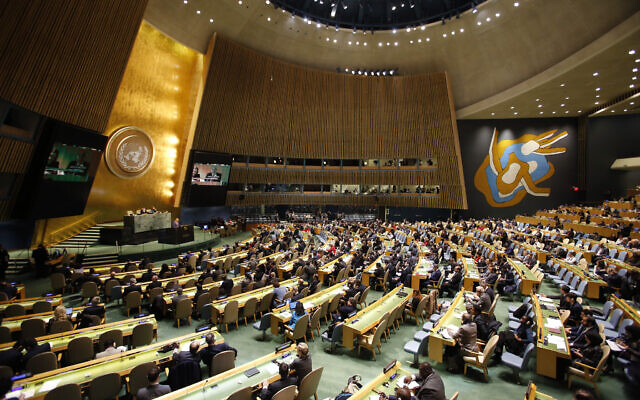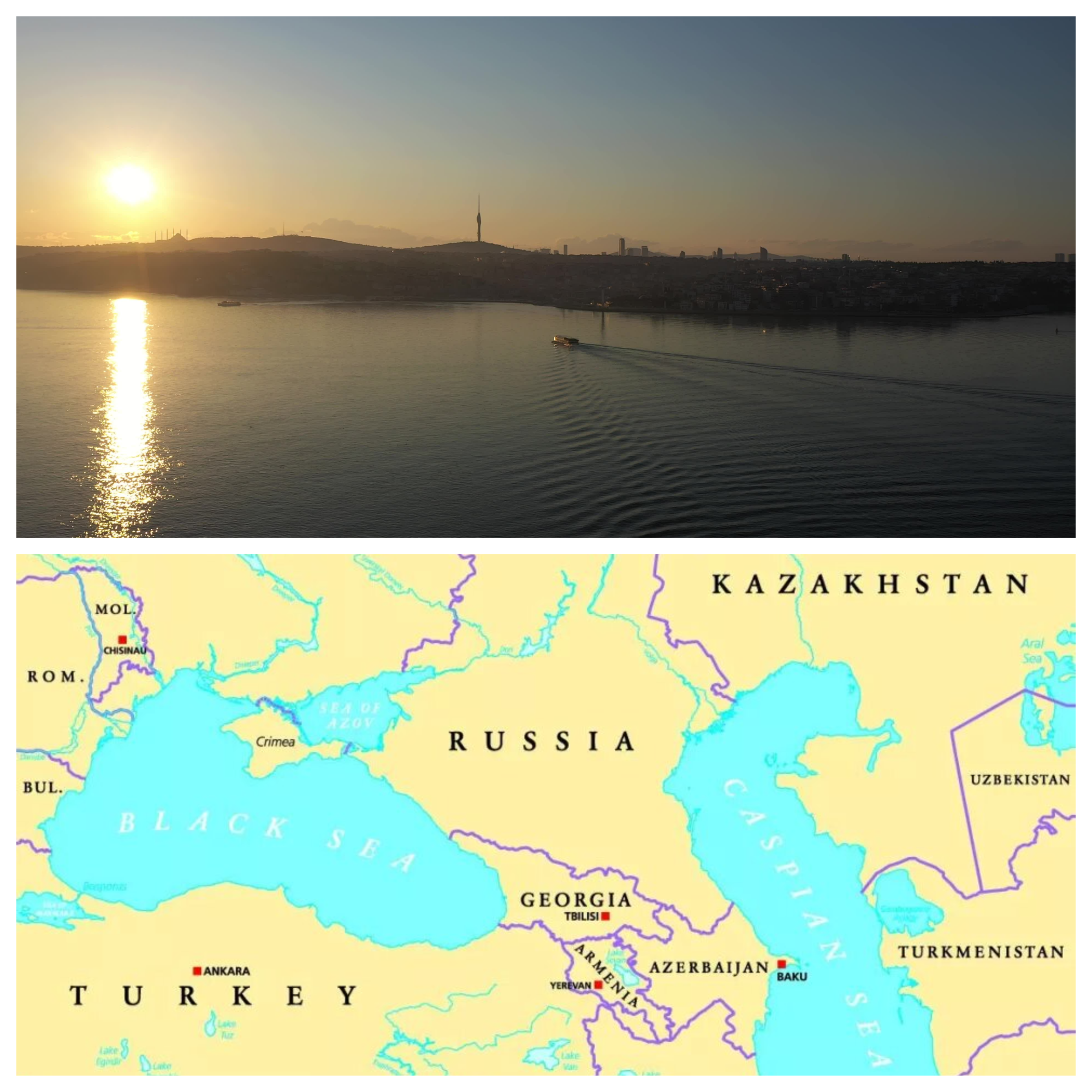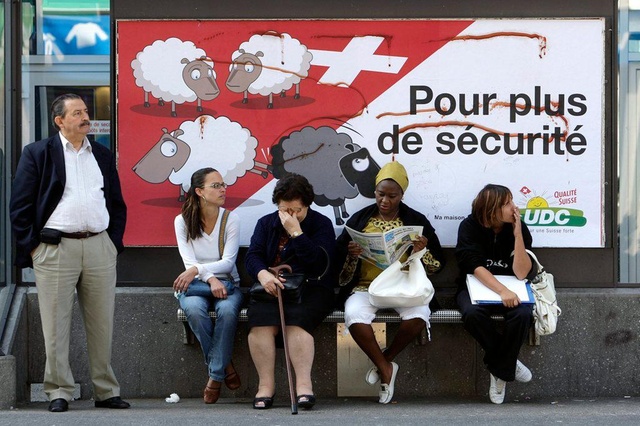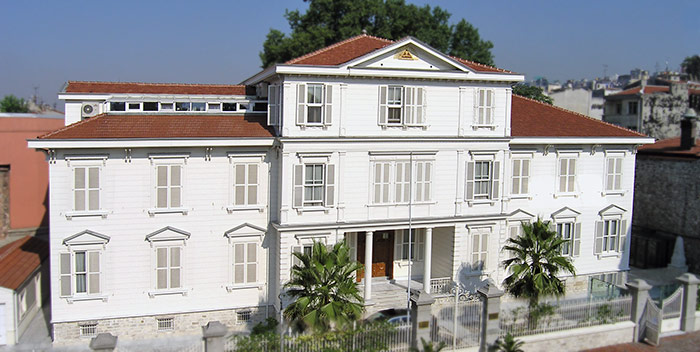
United Nations General Assembly (UNGA), on January 20, 2022, adopted a resolution regarding the Holocaust denial and rejected and condemned "without any reservation any denial of the Holocaust as a historical event, either in full or in part."[1] Resolution in its preambular part emphasizes the positive role of exercising the right to freedom of opinion and expression and full respect for the freedom to seek, receive and impart information for strengthening democracy and combating religious intolerance. It reaffirms the exercise of the right to freedom of expression. The resolution also states that freedom of expression involves special duties and responsibilities, therefore be subject to certain restrictions, but that these shall only be such as are provided by law and are necessary for respect of the rights or reputations of others and the protection of national security or public order, or of public health or morals. It further underscores that "all measures taken must be in full compliance with international human rights law, per article 19 of the International Covenant on Civil and Political Rights."[2] Finally, the resolution reaffirms that the Holocaust resulted in the murder of nearly 6 million Jews, 1.5 million of whom were children, comprising one-third of the Jewish people, and draws attention to the international legal basis of the Nuremberg Tribunal judgments regarding the Nazi perpetrators of the Holocaust as follows: "Reiterating the principles of international law recognized by the Charter of the Nürnberg Tribunal, and taking note with appreciation of their codification by the International Law Commission in 1950."[3] It should be mentioned that the Charter of the International Military Tribunal is an Annex to the Agreement for the prosecution and punishment of the major war criminals of the European Axis. [4]
The Holocaust, as is well-known, took place during the Second World War period, and the officials of Nazi Germany responsible for the Holocaust were convicted by the International Military Tribunal in Nuremberg in 1946. However, as it was explained in AVİM Research Paper titled "Degenerating Discursive Attempts in the Balkans to Alter the Legal Definition and Content of the Concept of Genocide," on December 11, 1946, one year after the final armistice, the U.N. General Assembly unanimously passed a resolution which stressed that "the punishment of the crime of genocide is a matter of international concern," and affirmed that "genocide is a crime under international law which the civilized world condemns, and for the commission of which principals and accomplices whether private individuals, public officials or statesmen, and whether the crime is committed on religious, racial, political or any other grounds - are punishable." resolution also requested the Economic and Social Council "to undertake the necessary studies, to draw up a draft convention on the crime of genocide to be submitted to the next regular session of the General Assembly. In the ensuing period, "The Convention on the Prevention and Punishment of the Crime of Genocide" (Genocide Convention) was adopted by the General Assembly of the United Nations on December 9, 1948,[5] and entered into force on January 12, 1951.[6] In this regard, the term "genocide," in the international law context, is a legal term that found its place in the legal terminology through the Genocide Convention. Thus, the Genocide Convention, which is the only and fundamental legally binding treaty in the context of international law on the establishment of the existence and punishment of genocide is, in any event, can not be applied retrospectively.[7] The 1948 U.N. Convention on genocide, as explained in AVİM Research Paper mentioned in footnote four, is drafted basically in response to the Holocaust. Therefore, the term can only be applied to tragedies after the Holocaust.
As can be seen from the recent U.N. General Assembly Resolution mentioned above, the international legal ground of the condemnation and rejection of the Holocaust denial is clearly explained in the resolution through reference to codification by the International Law Commission in 1950 of the Charter of the Nürnberg Tribunal. With this reference, UNGA has not linked the punishment of the perpetrators of the Holocaust only to the Charter of the Nuremberg Tribunal but also referred to the International Law Commission's decisions to make it valid internationally. This legal rigor demonstrated by the UNGA in its Resolution on Holocaust denial is an example that indicates the groundlessness, arbitrariness, and injustice of the baseless, purely political, obsessive, and ignorant accusations of genocide leveled against some nations on the pretext of tragic events that took place long before the 1948 Genocide Convention entered into force.
As per the press reports, Israel and Germany jointly proposed the UNGA resolution on Holocaust denial. [8] It is mentioned in the reports that the resolution was adopted at the 80th anniversary of the Wannsee Conference, when Nazi leaders met at a villa on the shores of Berlin's Wannsee lake to discuss the systematic murder of up to 11 million Jews in Europe. [9] According to a press release of the German Permanent Mission to the U.N., with this resolution, "for the first time in a U.N. resolution, a definition of what constitutes Holocaust denial could be included." [10] It is also reported the statement made by Israel's U.N. Ambassador Gilad Erdan in the Assembly who said that "we now live in an era in which fiction is becoming fact, and the Holocaust is becoming a distant memory,... as this happens following the greatest crime in human history, now comes the greatest cover-up in human history." He further said that the resolution preserves the memory of the 6 million victims and is a commitment to make sure that Holocaust distortion and denial will be tolerated no more. According to the news, Israel's Permanent Representative also criticized social media platforms such as Facebook, Twitter, and YouTube that spread the pandemic of distortions and lies about the Holocaust, emphasizing that social media giants can no longer remain indifferent to the hatred spreading on their platforms, and said that these platforms should take immediate action on this issue. [11]
On the other hand, it is also reported that the resolution was adopted without a vote; however, Iran's representative disassociated his country from the resolution. The U.N. Meetings Coverage and Press Release website reflects the intervention of Iran's representative as follows:
Iran's representative disassociated his country from the resolution although it did not block the passage of the text. Strongly rejecting the attempt to misuse the concept of the Second World War to provide cover for the continuing practices of racism and expansionism, he said: "The Israeli regime has applied both in its policies and practices over seven decades." Its brutal crimes against Palestine, which include ethnic cleansing, an inhumane blockage and forced evictions, have continued, he said. [12]
As per the Deutsche Welle report, German Foreign Minister Annalena Baerbock has also made a statement and said that "even 80 years after the Wannsee Conference, it was essential to remember how German diplomats became complicit in Nazi crimes." While commemorating the victims of the Holocaust, she reminded them that "Officials from the Foreign Office who put themselves at the service of crimes and genocide by the Nazi regime are also to blame for their suffering" and vowed not to forget what Germany did the Holocaust victims. [13]
As the German Foreign Minister stated in her statement, will Germany never forget what it did to the victims of the Holocaust? According to the data released by the Arolsen Archives- International Center for Nazi Persecution about results of the Rheingold Institute study based on the principles of depth psychology exploring Generation Z's attitude towards National Socialism in Germany, the current generation of 16-25 years old (Gen Z) are much more interested in the Nazi era than their parent's generation (75% vs. 66%). However, when dealing with the past, Gen Z draws analogies with urgent problems facing society today, such as racism and discrimination. [14]
In our various AVİM analyzes, we have drawn attention to developments such as the rise of the extreme right in German society and the rise of Islamophobia, which can also be described as anti-Muslim racism. [15] In this context, it should be noted that there are justifiable reasons for German Generation Z to make anology between past developments and the urgent problems facing German society today, such as racism and discrimination, as stated above. In this context, we gave detailed information in our analysis about the neo-Nazi Nationalist Socialist Underground (NSU) terrorist organization that murdered ten people between 2000 and 2007, eight of whom were members of the Turkish community living in Germany.[16] In this respect, we pointed out that ten years after the NSU neo-Nazi terror cell was exposed, with the decision of the German Federal Court of Justice at the end of last year (2021), the NSU case was concluded legally, and despite the existence of a number of unanswered questions, the issue was legally closed. [17]
It is an apparent development that apart from the rise in Holocaust denial, racism, xenophobia, and Islamophobia are on the rise in Germany and most Western European countries. As we have emphasized in our various AVİM analyzes and comments, the combination of racism and xenophobia brings the concept of xeno- racism, including anti-Muslim racism/Islamophobia, to the fore. These phenomena, together with anti-Semitism, unite in a single discrimination structure. We can liken this structure to matryoshka dolls. As each piece unfolds, another type of discrimination emerges from within. The Holocaust constitutes the most painful and tragic example of human history among these phenomena.
January 27, 2022, was the International Holocaust Remembrance Day. On this sad occasion, as AVİM, we commemorate with deep respect millions of Jews, Roma people, disabled persons, as well as targeted minorities and groups, who were systematically murdered by the Nazi regime and its collaborators.
*Photo: https://www.timesofisrael.com/
[1] UN. General Assembly (76th sess. : 2021-2022), “Holocaust Denial : Resolution / Adopted by the General Assembly” (United Nations, January 25, 2022), A/RES/76/250, https://undocs.org/en/A/RES/76/250.
[2] UN. General Assembly (21st sess. : 1966), “International Covenant on Economic, Social and Cultural Rights, International Covenant on Civil and Political Rights and Optional Protocol to the International Covenant on Civil and Political Rights” (United Nations, 1967), A/RES/2200(XXI)[A], https://www.ohchr.org/documents/professionalinterest/ccpr.pdf.
[3] United Nations, “Principles of International Law Recognized in the Charter of the Nürnberg Tribunal and in the Judgment of the Tribunal, with Commentaries” (Yearbook of the International Law Commission, 1950), https://legal.un.org/ilc/texts/instruments/english/commentaries/7_1_1950.pdf.
[4] This document, commonly known as the Charter of the Nürnberg Tribunal (or Nuremberg Tribunal) formed an integral part of the Agreement for the establishment of an international military tribunal, which was signed in London on 8 August 1945. United Kingdom of Great Britain and Northern Ireland, United States of America, France and Union of Soviet Socialist Republics, “Charter of the International Military Tribunal - Annex to the Agreement for the Prosecution and Punishment of the Major War Criminals of the European Axis (‘London Agreement’)” (United Nations, August 8, 1945), https://www.refworld.org/docid/3ae6b39614.html.
[5] Teoman Ertuğrul Tulun, “Degenerating Discursive Attempts In The Balkans To Alter The Legal Definition And Content Of The Concept Of Genocide,” Center For Eurasian Studies Research Paper Series, no. 3 (December 16, 2021): 9, https://doi.org/10.31219/osf.io/dpqs4 , https://avim.org.tr/en/Rapor/DEGENERATING-DISCURSIVE-ATTEMPTS-IN-THE-BALKANS-TO-ALTER-THE-LEGAL-DEFINITION-AND-CONTENT-OF-THE-CONCEPT-OF-GENOCIDE.
[6] United Nations, “Convention on the Prevention and Punishment of the Crime of Genocide : Chapter IV Human Rights” (United Nation, December 9, 1948), 12 January 1951, No. 1021, https://treaties.un.org/pages/ViewDetails.aspx?src=IND&mtdsg_no=IV-1&chapter=4&clang=_en.
[7] William Schabas, Unimaginable atrocities: justice, politics, and rights at the war crimes tribunals (Oxford: Oxford University Pres, 2014), 63.
[8] Deutsche Deutsche Welle Editorial Team, “UN General Assembly Adopts German-Israeli Proposal against Holocaust Denial,” Deutsche Welle, accessed February 3, 2022, https://www.dw.com/en/un-general-assembly-adopts-german-israeli-proposal-against-holocaust-denial/a-60490310.
[9] Michael Hernandez, “UN General Assembly Adopts Israeli Resolution on Holocaust Denial,” Anadolu News Agency, January 20, 2022, https://www.aa.com.tr/en/americas/un-general-assembly-adopts-israeli-resolution-on-holocaust-denial/2480983.
[10] Permanent Mission of the Federal Republic of Germany to the United Nations in New York, “UN General Assembly Adopts Resolution on Holocaust Denial” (Federal Republic of Germany, January 20, 2022), https://new-york-un.diplo.de/un-en/news-corner/-/2507408.
[11] Edith M. Lederer, “UN Approves Resolution Condemning Denial of Nazi Holocaust,” Associated Press, January 21, 2022, sec. United Nations General Assembly, https://apnews.com/article/united-nations-general-assembly-business-world-war-ii-race-and-ethnicity-racial-injustice-5efe0f0596fbf2988b8cd812ece8e2f1; Edith M. Lederer, “Israel Hopes UN Will Unanimously Condemn Holocaust Denial - The Washington Post,” Washington Post, January 20, 2022, sec. World, https://web.archive.org/web/20220120074704/https://www.washingtonpost.com/world/israel-hopes-un-will-unanimously-condemn-holocaust-denial/2022/01/20/fae94522-79b0-11ec-9dce-7313579de434_story.html.
[12] United Nations General Assembly, “Condemning Holocaust Denial, General Assembly Adopts Resolution Urging Development of Educational Programmes to Prevent Genocide Acts among Future Generations” (United Nations, January 20, 2022), GA/12400, https://www.un.org/press/en/2021/ga12400.doc.htm.
[13] Deutsche Welle Editorial Team, “UN General Assembly Adopts German-Israeli Proposal against Holocaust Denial.”
[14] Bad Arolsen, “The Nazi Era as a Test of Courage: Strange Fascination and High Receptiveness of Gen Z,” Arolsen Archives, January 25, 2022, sec. Press Release, https://arolsen-archives.org/content/uploads/press-release-genz-nazi-history.pdf.
[15] Teoman Ertuğrul Tulun, “Germany’s Far-Right Terrorism And The Timid NSU Case Verdict,” Center For Eurasian Studies Analysis Series (AVİM) 2020, no. 26 (September 25, 2020): 10, https://doi.org/10.31219/osf.io/s5jm8 , https://avim.org.tr/en/Analiz/GERMANY-S-FAR-RIGHT-TERRORISM-AND-THE-TIMID-NSU-CASE-VERDICT.
[16] Teoman Ertuğrul Tulun, “Far-Right Violence And Terrorism Rises In Germany: National Socialist Underground (NSU) Terrorist Group And The Murders Of Eight Turkish-German Citizens,” Center For Eurasian Studies Analysis Series (AVİM) 2019, no. 20 (August 26, 2019): 8, https://doi.org/10.31219/osf.io/6pf75 , https://avim.org.tr/en/Analiz/FAR-RIGHT-VIOLENCE-AND-TERRORISM-RISES-IN-GERMANY-NATIONAL-SOCIALIST-UNDERGROUND-NSU-TERRORIST-GROUP-AND-THE-MURDERS-OF-EIGHT-TURKISH-GERMAN-CITIZENS-1 .
[17] Teoman Ertuğrul Tulun, “NSU CASE COVERED UP AND LEGALLY CLOSED: IS IT POSSIBLE TO AVOID SOCIAL AND POLITICAL REPERCUSSIONS?,” Center For Eurasian Studies (AVİM), December 20, 2021, https://osf.io/dx2bf/ , https://avim.org.tr/en/Yorum/NSU-CASE-COVERED-UP-AND-LEGALLY-CLOSED-IS-IT-POSSIBLE-TO-AVOID-SOCIAL-AND-POLITICAL-REPERCUSSIONS .
© 2009-2025 Center for Eurasian Studies (AVİM) All Rights Reserved
No comments yet.
-
 CENTURY OLD “WHITE SUPREMACISM” AND THE FAR-RIGHT’S RISE IN SWEDEN: A CREDIBLE CHALLENGE TO PROGRESSIVE VALUES AND POLICIES?
CENTURY OLD “WHITE SUPREMACISM” AND THE FAR-RIGHT’S RISE IN SWEDEN: A CREDIBLE CHALLENGE TO PROGRESSIVE VALUES AND POLICIES?
Teoman Ertuğrul TULUN 25.01.2018 -
 AT THE CROSSROADS: TÜRKİYE AND THE BATTLE FOR BLACK SEA ORDER
AT THE CROSSROADS: TÜRKİYE AND THE BATTLE FOR BLACK SEA ORDER
Teoman Ertuğrul TULUN 21.10.2025 -
 COVID-19 AND CORONA BONDS HAVE UNMASKED THE FRAGILITY OF THE EU
COVID-19 AND CORONA BONDS HAVE UNMASKED THE FRAGILITY OF THE EU
Teoman Ertuğrul TULUN 22.04.2020 -
 EROSION IN ARMS CONTROL REGIMES CONTINUES
EROSION IN ARMS CONTROL REGIMES CONTINUES
Teoman Ertuğrul TULUN 12.10.2023 -
 SOUL-SEARCHING IN SOUTHEAST ASIA: EMERGING RIFTS BETWEEN OLD FRIENDS AND NEW FOREIGN POLICY DIRECTIONS
SOUL-SEARCHING IN SOUTHEAST ASIA: EMERGING RIFTS BETWEEN OLD FRIENDS AND NEW FOREIGN POLICY DIRECTIONS
Teoman Ertuğrul TULUN 17.01.2017
-
 THE NAGORNO-KARABAKH ISSUE FROM A JURIDICAL POINT OF VIEW: THE CASE OF CHIRAGOV AND OTHERS V. ARMENIA
THE NAGORNO-KARABAKH ISSUE FROM A JURIDICAL POINT OF VIEW: THE CASE OF CHIRAGOV AND OTHERS V. ARMENIA
Turgut Kerem TUNCEL 26.06.2015 -
 THE INTERSECTION OF CONTEMPORARY XENOPHOBIA AND RACISM IN WESTERN EUROPE: THE CASE OF SWITZERLAND
THE INTERSECTION OF CONTEMPORARY XENOPHOBIA AND RACISM IN WESTERN EUROPE: THE CASE OF SWITZERLAND
Teoman Ertuğrul TULUN 24.03.2020 -
 THE ELECTION PROCESS OF THE ARMENIAN PATRIARCH OF ISTANBUL HAS BEEN RESET
THE ELECTION PROCESS OF THE ARMENIAN PATRIARCH OF ISTANBUL HAS BEEN RESET
Mehmet Oğuzhan TULUN 09.05.2018 -
 AT THE CROSSROADS: TÜRKİYE AND THE BATTLE FOR BLACK SEA ORDER
AT THE CROSSROADS: TÜRKİYE AND THE BATTLE FOR BLACK SEA ORDER
Teoman Ertuğrul TULUN 21.10.2025 -
 CHURCH INTERFERENCE IN ARMENIA’S NORMALIZATION POLICIES
CHURCH INTERFERENCE IN ARMENIA’S NORMALIZATION POLICIES
Mehmet Oğuzhan TULUN 14.08.2024
-
25.01.2016
THE ARMENIAN QUESTION - BASIC KNOWLEDGE AND DOCUMENTATION -
12.06.2024
THE TRUTH WILL OUT -
27.03.2023
RADİKAL ERMENİ UNSURLARCA GERÇEKLEŞTİRİLEN MEZALİMLER VE VANDALİZM -
17.03.2023
PATRIOTISM PERVERTED -
23.02.2023
MEN ARE LIKE THAT -
03.02.2023
BAKÜ-TİFLİS-CEYHAN BORU HATTININ YAŞANAN TARİHİ -
16.12.2022
INTERNATIONAL SCHOLARS ON THE EVENTS OF 1915 -
07.12.2022
FAKE PHOTOS AND THE ARMENIAN PROPAGANDA -
07.12.2022
ERMENİ PROPAGANDASI VE SAHTE RESİMLER -
01.01.2022
A Letter From Japan - Strategically Mum: The Silence of the Armenians -
01.01.2022
Japonya'dan Bir Mektup - Stratejik Suskunluk: Ermenilerin Sessizliği -
03.06.2020
Anastas Mikoyan: Confessions of an Armenian Bolshevik -
08.04.2020
Sovyet Sonrası Ukrayna’da Devlet, Toplum ve Siyaset - Değişen Dinamikler, Dönüşen Kimlikler -
12.06.2018
Ermeni Sorunuyla İlgili İngiliz Belgeleri (1912-1923) - British Documents on Armenian Question (1912-1923) -
02.12.2016
Turkish-Russian Academics: A Historical Study on the Caucasus -
01.07.2016
Gürcistan'daki Müslüman Topluluklar: Azınlık Hakları, Kimlik, Siyaset -
10.03.2016
Armenian Diaspora: Diaspora, State and the Imagination of the Republic of Armenia -
24.01.2016
ERMENİ SORUNU - TEMEL BİLGİ VE BELGELER (2. BASKI)
-
AVİM Conference Hall 24.01.2023
CONFERENCE TITLED “HUNGARY’S PERSPECTIVES ON THE TURKIC WORLD"









